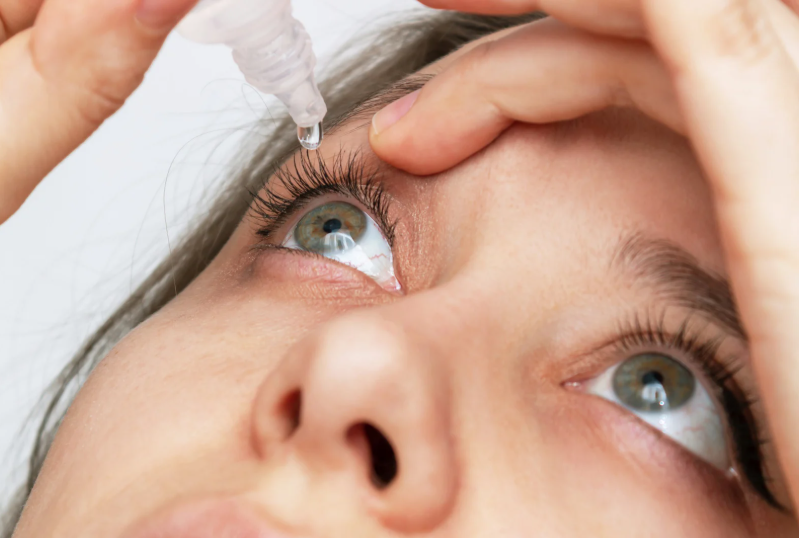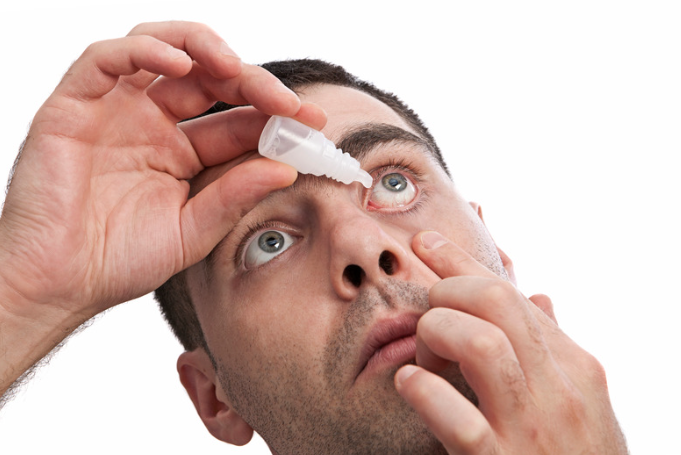How Air Conditioning Contributes to Dry Eyes & How to Prevent It
Air-conditioned spaces provide relief from heat and humidity, but they can also lead to dry eyes due to reduced air moisture. Prolonged exposure to artificial cooling can cause eye discomfort, irritation, and blurry vision. Using the best eye drops for dry eyes, maintaining hydration, and adopting protective habits can help prevent dry eyes. In this guide, we explore how to safeguard your eyes in air-conditioned environments and the role of dry eye drops in maintaining eye moisture.
How Air Conditioning Causes Dry Eyes
Air conditioning removes moisture from the air, creating a dry environment that accelerates tear evaporation. This leads to dry eyes, characterized by irritation, burning, and a gritty sensation.
Factors That Contribute to Dry Eyes Indoors
Low humidity – Dry air causes tears to evaporate faster.
Constant airflow – Air vents or fans blowing directly onto your face worsen dry eyes.
Prolonged screen time – Reduced blinking while working on digital screens leads to tear instability.
Lack of hydration – Dehydration affects tear production, making eye care drops essential.
Best Eye Drops for Dry Eyes in Air-Conditioned Spaces
Using the best eye drops for dry eyes is the quickest way to relieve irritation caused by artificial cooling.
Types of Dry Eye Drops to Use
Lubricating Eye Drops – These mimic natural tears and provide instant relief.
Gel-Based Eye Drops – Thicker than regular dry eye drops, they offer longer-lasting moisture.
Preservative-Free Eye Drops – Ideal for sensitive eyes and frequent use.
Hyaluronic Acid-Based Eye Care Drops – Help retain moisture and prevent tear evaporation.
Using eye care drops regularly prevents irritation and keeps your eyes comfortable even in dry indoor conditions.
Simple Habits to Prevent Dry Eyes in Air-Conditioned Offices
1. Adjust Your Workstation Setup
Keep air vents away from your face to reduce direct airflow.
Use a humidifier to maintain moisture in the air.
Take regular screen breaks to allow your eyes to rest.
2. Follow the 20-20-20 Rule
Every 20 minutes, look at an object 20 feet away for 20 seconds to reduce eye strain and blinking-related dry eyes.
3. Blink More Frequently
Air-conditioned spaces and screens cause dry eyes by reducing blink rates. Make a conscious effort to blink more to spread natural tears across your eyes.

Hydration & Nutrition: Natural Ways to Fight Dry Eyes
Hydration Tips for Preventing Dry Eyes
Drink at least 8 glasses of water daily to maintain tear film hydration.
Avoid excessive caffeine and alcohol, as they contribute to dehydration and dry eyes.
Eat water-rich foods like cucumbers, oranges, and watermelon to support eye moisture.
Eye-Friendly Nutrients to Prevent Dry Eyes
Omega-3 Fatty Acids – Found in flaxseeds, walnuts, and fish, they improve tear quality.
Vitamin A – Found in carrots and sweet potatoes, it supports tear production.
Vitamin C & E – Antioxidants that protect the eyes from dryness and irritation.
Zinc – Helps maintain eye health and tear stability.
Nighttime Eye Care: Protecting Your Eyes While You Sleep
If you sleep in an air-conditioned room, your eyes may dry out overnight. Here’s how to protect them:
Use an eye mask – Prevents air exposure while you sleep.
Apply lubricating dry eye drops before bed – Keeps your eyes moist overnight.
Set AC temperature to a moderate level – Extremely cold air worsens dry eyes.
When to See a Doctor for Persistent Dry Eyes
If symptoms persist despite using the best eye drops for dry eyes and following hydration tips, consult an eye specialist. Chronic dry eyes may require prescription eye care drops or advanced treatments like punctal plugs or light therapy.
Signs You Need Professional Help
Constant dryness despite using dry eye drops
Redness, irritation, and excessive tearing
Blurry vision or eye fatigue
Sensitivity to light
Lifestyle Changes to Reduce Dry Eyes in Air-Conditioned Spaces
While using the best eye drops for dry eyes is essential, making small lifestyle changes can further prevent dry eyes and improve overall eye comfort.
1. Reduce Screen Time When Possible
Prolonged exposure to digital screens exacerbates dry eyes by reducing blink frequency. Try the following:
Adjust screen brightness to match room lighting.
Increase font size to avoid unnecessary eye strain.
Take frequent breaks using the 20-20-20 rule to relax your eyes.
2. Avoid Rubbing Your Eyes
When experiencing dry eyes, avoid rubbing them, as this can cause irritation or even damage the cornea. Instead, apply eye care drops or use a cool compress to relieve discomfort.
3. Wear Protective Eyewear
If you spend long hours in air-conditioned spaces, consider wearing blue-light-blocking glasses to reduce strain and retain eye moisture. Additionally, wrap-around glasses or moisture chamber glasses can help trap humidity around your eyes.
4. Maintain a Balanced Diet
As mentioned earlier, your diet plays a critical role in preventing dry eyes. To further boost your eye health: Consume leafy greens like spinach and kale, which contain lutein and zeaxanthin—important nutrients for eye protection.
Add chia seeds, almonds, and avocados to your meals for healthy fats that support tear production.
Drink herbal teas like chamomile or green tea, which have anti-inflammatory properties beneficial for dry eyes.
How Humidity Levels Affect Dry Eyes
Since air-conditioned environments lower humidity levels, maintaining the right indoor moisture level is essential to prevent dry eyes.
Ways to Increase Indoor Humidity:
Use a humidifier – Keeps air moisture balanced, reducing eye dryness.
Place bowls of water near vents – Helps add humidity to the air naturally.
Keep indoor plants – Plants like peace lilies and areca palms release moisture into the air.
By making small adjustments to your surroundings, you can create a more eye-friendly environment, reducing the need for frequent eye care drops.
The Importance of Proper Eye Hygiene
Maintaining good eye hygiene is another essential step in preventing dry eyes. Follow these simple habits:
Clean your eyelids daily with a mild eyelid cleanser or warm water to remove debris and bacteria.
Avoid excessive makeup around the eyes, as it can block oil glands.
Replace old eye care products to prevent contamination that could worsen dry eyes.
Final Thoughts: Keeping Your Eyes Moist in Air-Conditioned Spaces
Air-conditioned environments can make dry eyes worse, but with the right approach, you can keep your eyes comfortable and healthy. Using the best eye drops for dry eyes, staying hydrated, eating a nutrient-rich diet, and adjusting your indoor environment can help prevent irritation and discomfort.
By making small lifestyle changes and incorporating eye care drops into your routine, you can enjoy a cool, comfortable indoor environment without compromising your eye health.
Take the First Step Today!
Stay hydrated.
Use dry eye drops regularly.
Adjust your indoor humidity.
Follow an eye-friendly diet.
Your eyes deserve the best care, even in air-conditioned spaces.







